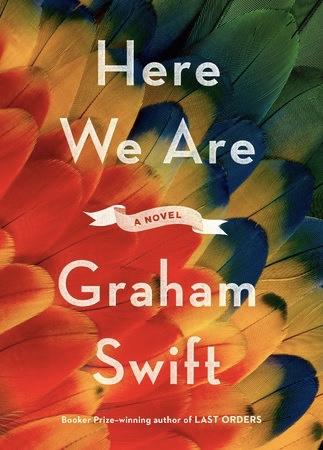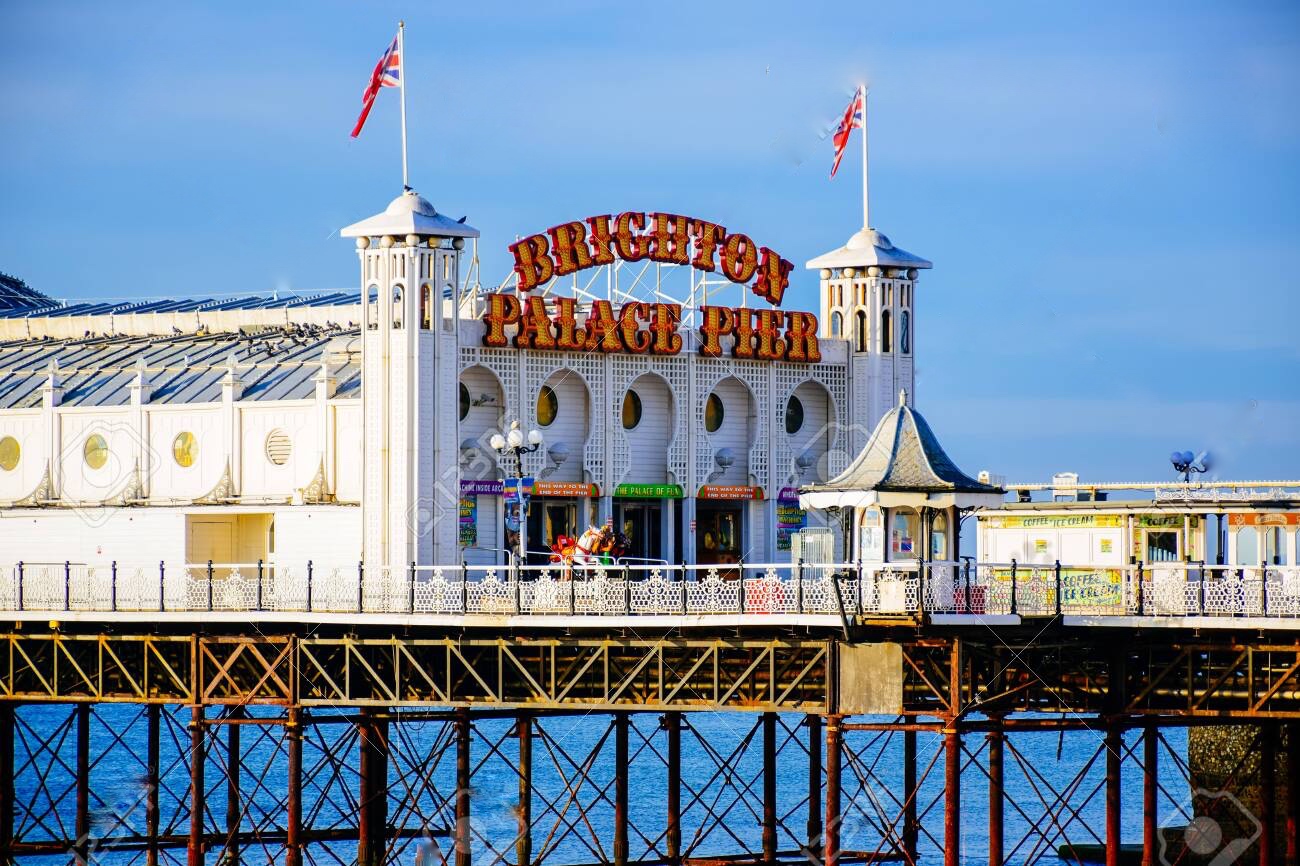Note: Author Graham Swift has been WINNER of the James Tait Black Memorial Prize and WINNER of the Booker Prize for his novel Last Orders.
“Down here at the back of the auditorium, [Jack] was part of the audience and he wasn’t. He was Jack Robinson and he wasn’t…In the darkness, neither in nor out of the audience, he would sometimes feel the thinness, the fakery of the plush rapt edifice around him. Plush? Turn up the lights and you’d soon see, he knew, how tatty, how shabby, how sham it all was.”
 In entitling his latest thought-provoking book Here We Are, Graham Swift announces to the reader in advance that all the clues to understanding the people whose lives are the subject of this story are here, already present within this narrative. In the opening quotation, for example, Jack Robbins, known on stage as Jack Robinson, the “compere” of a variety show on the Brighton Pier, enjoys spending time sitting in the audience at the back of the theatre during some of the acts each night. He is especially intrigued by the magic act – seeing and appreciating all the illusions and the role-playing that are going on but understanding that those magical illusions are artificially created – all part of a giant “sham” controlled by the magician. Jack even goes so far as to remind himself that the theatre itself, the “plush edifice” around him, is also a tatty, shabby, sham. Jack and his co-workers, Ronnie and Evie, the magician and his assistant, who are the other main characters here, lead lives which have obviously made them who they are, though all lack the kind of insight which allows them to connect and resolve their present lives with their past. As a result, all the characters simply exist in the moment, instead of truly living. “Here we are,” they seem to say to the reader – working from day to day without much depth of thought.
In entitling his latest thought-provoking book Here We Are, Graham Swift announces to the reader in advance that all the clues to understanding the people whose lives are the subject of this story are here, already present within this narrative. In the opening quotation, for example, Jack Robbins, known on stage as Jack Robinson, the “compere” of a variety show on the Brighton Pier, enjoys spending time sitting in the audience at the back of the theatre during some of the acts each night. He is especially intrigued by the magic act – seeing and appreciating all the illusions and the role-playing that are going on but understanding that those magical illusions are artificially created – all part of a giant “sham” controlled by the magician. Jack even goes so far as to remind himself that the theatre itself, the “plush edifice” around him, is also a tatty, shabby, sham. Jack and his co-workers, Ronnie and Evie, the magician and his assistant, who are the other main characters here, lead lives which have obviously made them who they are, though all lack the kind of insight which allows them to connect and resolve their present lives with their past. As a result, all the characters simply exist in the moment, instead of truly living. “Here we are,” they seem to say to the reader – working from day to day without much depth of thought.
In August, 1959, Jack, the twenty-eight-year-old host of the variety show in the Brighton Palace Pier Theatre, already has twelve years of experience at the job, yet he is still feeling panic and vertigo before he goes on stage to assume his role. “It posed the paralyzing question of who he was in the first place, and the answer was simple. He was nobody…And where was he? He was nowhere…on a flimsy structure built over swirling water.” Jack thinks of his mother, giving him the necessary “brutal shove” he needed to get out on stage, and his absent father, a man who simply disappeared. As he gets ready to go on stage, Jack thinks of Ronnie Dean, now the show’s magician, who had been in the army with him, and Evie White, Ronnie’s fiancée and assistant with his act, and then flashes forward and thinks of the end of summer when all the shows are over, only existing in the memories of those who saw them. Ronnie and Evie, having had an extremely successful summer and a whole career ahead of them, we learn, “never appeared on stage again,” while Ronnie himself, “never appeared again at all.”

The tube station at Bethnal Green, to which people rushed to escape bombings during the war, was the site of a major loss of life, memorialized in THE REPORT, by Jessica Francis Kane. See photo credits at end of review for more information.
Ronnie’s story, with and without his live presence, becomes the focus of most of the book. Growing up in “the humblest of houses” in Bethnal Green, Ronnie, the son of a charwoman and a merchant seaman, saw very little of his father. On one of his brief stops at home, however, his father brought Ronnie a green parrot named Pablo, a present which excited Ronnie, in part because it could say its own name. As soon as the father leaves town, however, the bird vanishes, and Ronnie misses it, “as one might miss something that might not have been there in the first place.” Soon after, Ronnie, at age eight, is taken to the railroad station and put on a train for Oxfordshire, to a house called “Evergrene,” where he will live with Eric and Penny Lawrence during five years of World War II. Ronnie and the Lawrences become especially close, as the Lawrences have no children, and when Ronnie learns that Eric Lawrence has a private career as a magician – and that he is willing to teach Ronnie some of the secrets of the trade – he is an enthusiastic learner, an experience that Jack Robbins later refers to as his “sorcerer’s apprenticeship.” When he is fourteen, Ronnie is returned to his mother, though he secretly visits the Lawrences on weekends, enjoying their company and continuously improving his magic.
Evie White, the third character, straddles two worlds. Her first role is as Ronnie’s assistant and later in the summer, she is his fiancée. At the end of the summer, when Ronnie suddenly disappears, however, Evie has to make a new life. The fates of all three characters are further developed in a flash forward which takes place in 2009, fifty years after Evie’s marriage to Jack. With all the temporary changes that dramatically affect Jack, Ronnie, and Evie in their childhoods and early adulthood, the crux of the novel and its resolutions are saved for the conclusion. Secrets, magic, and illusions combine in the lives of all three characters, and as the characters deal with how fantasy and illusion affect their behavior going forward in time, the reader’s understanding of the author’s themes of how one’s reality, responsibility, and ultimately identity are affected by the imagination expands in surprising ways.
Evie achieves some resolution some years after Ronnie’s disappearance when she visits Evergrene, the house where Ronnie spent the war, but she has no one to share her discoveries with. Ronnie, before his disappearance, had seen himself “moving from magic to wizardry…and Ronnie recognized in himself the ability to cross [the line].” His disappearance makes it impossible for the reader to know if he succeeded in crossing the line to new understandings about life, or if the disappearance itself is the answer. White doves, rainbows, and a parrot in Ronnie’s grand finale at the theater in 1959, contrast with secret discoveries about Ronnie and his upbringing that Evie pursues late in life and help set the stage for Evie’s own sense of resolution at the conclusion. “Life is unfair, you do or you don’t have your moment,” she says. “And if the show must come to an end, then there’s always the sound theatrical argument: Save the best till last.” In what may be his most compressed, thematically dense, and intriguing novel in recent years, Graham Swift, too, may have saved the best till last.
Also reviewed here: MOTHERING SUNDAY and WISH YOU WERE HERE
Photos. The theatre where Jack, Ronnie, and Evie performed was at the end of Brighton Pier. https://www.123rf.com
The tube station at Bethnal Green (see https://commons.wikimedia.org) to which people rushed to escape bombings during World War II, was the site of a major loss of life, memorialized in THE REPORT, a beautifully written piece of non-fiction by Jessica Francis Kane: http://marywhipplereviews.com/jessica-francis-kane-the-report-england/
Ronnie’s dad gave him a green parrot named Pablo, a gift he memorialized in his stage name. https://www.123rf.com
Author Graham Swift has been WINNER of the James Tait Black Memorial Prize and WINNER of the Booker Prize for his 1996 novel Last Orders. Author photo: https://alchetron.com



